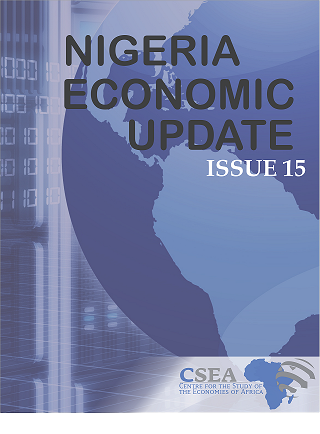Consumer Price Index, the measure for inflation rate, declined (Year-on-Year) for the fourteenth consecutive month in March 2018. Headline inflation dropped to 13.34 percent1 – representing a marginal 0.99 percentage-points decrease, and lowest inflation rate in two years. The sub-indices moved in tandem with headline inflation as food inflation fell from 17.59 percent to 16.08 percent, while core inflation moderated to 11.20 percent, down slightly from 11.70 percent. The year-on-year decline is attributable to base effects of higher prices in corresponding month of 2017. Additionally, stable exchange rate moderated the impact of imported consumer goods prices2. Going forward, to stimulate further decline in both food and core inflation rates, it is necessary to promote investment in the agriculture sector as well as to foster policies that promote forex reserve growth and exchange rate stability.
Macroeconomic Report & Economic Updates

March 8, 2018
Nigeria Economic Update (Issue 15)
Consumer Price Index, the measure for inflation rate, declined (Year-on-Year) for the fourteenth consecutive month in March 2018. Headline inflation dropped to 13.34 percent1 – representing a marginal 0.99 percentage-points decrease, and lowest inflation rate in two years. The sub-indices moved in tandem with headline inflation as food inflation fell from 17.59 percent to 16.08 […]
Read →
Related
Nigeria Economic Update (Issue 12)
The Naira sustained its appreciation trajectory at the parallel market in the review week. Precisely, naira gained 13.3 percent (Week-on-Week) to exchange at N390/$ on March 24, 2017. Reduced pressure on the naira followed moderation in speculative activities as a result of increased forex sales and intervention by the CBN (daily intervention of $1.5 million at the interbank market.) The aim of CBN interventions (narrowing the gap between interbank and parallel market rates) seems to be on course with the continued appreciation of the naira at alternative markets. While current approach of the apex bank proves effective in improving international value of naira in the short term, however, it is expedient that the bank articulates clear and credible flexible exchange rate policy to sustain the momentum and enhance confidence in the forex market in the medium term. Nonetheless, the sustainability of the exchange rate gains is partly dependent on the prospect of crude oil price and production which is outside the purview of the monetary authorities.
